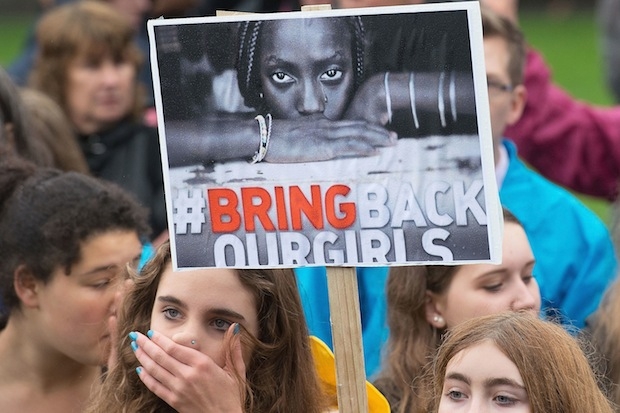‘We don’t do God,’ was Alastair Campbell’s put-down when his charge, Tony Blair, was tempted to raise the issue of his faith. Unfortunately, it seems to have become the motto of David Cameron’s government. It is a month now since 276 girls were kidnapped from a school near the town of Chibok in northern Nigeria, and still the Foreign Office’s statements on the crisis read like a deliberate exercise in missing the point.
‘Continuing murders and abductions of schoolchildren, particularly girls in Nigeria by Boko Haram, are a stark reminder of the threat faced by women and girls in conflict-prone areas,’ Mark Simmonds, minister for Africa, said this week. ‘Young children are being denied universal freedoms such as an education.’ That may be true for many girls in Africa, but not ones abducted from a school. What Mr Simmonds failed to say is that the girls were almost all Christian, kidnapped by Islamists who threatened to sell them into sexual slavery.
Why can’t our government make that point? It is not as if there were any doubt over the matter. Boko Haram is not shy about its objectives. It has been waging war against Christians in Nigeria for years. On Christmas Day 2011 it killed at least 50 and injured hundreds more in a series of attacks on churches. The toll would have been far higher if two bombs had not been successfully defused. The following May, a spokesman for the terrorists said: ‘We will create so much effort to have an Islamic state that Christians will not be able to stay.’ This is in Nigeria, the richest country in Africa.
This week Mr Simmonds flies to Abuja to join a team of Foreign Office staff who are offering their help to resolve the crisis. Perhaps someone there will explain to him its religious nature. Just as the British government was late to recognise the sectarian slaughter in Kosovo, it now seems un-able to comprehend what is happening across much of the world. For months after the Arab spring of 2011, ministers continued to hail the event purely in terms of a democratic rebellion against dictatorial regimes, without acknowledging that Islamist groups were taking advantage of the situation.
There has been no Arab spring if you are a Coptic Christian in Egypt. Churches have been burned, or daubed with graffiti stating that henceforth Egypt will be only a Muslim country. Three were gunned down at a Coptic wedding last October in Cairo, a city where Christian and Muslims have lived peacefully together for centuries. Tunisia has gone from being a secular state where Christians could worship freely to one where a convert from Islam could be hacked to death in the street. Post-Gaddafi Libya is in danger of going down the same road.
When Hague visited Algeria recently, he did not mention its ban on any Christian activity outside state-licensed buildings. We hear plenty of protests about the lack of racial and gender equality in other countries, but our campaign for religious freedom seems to stop at Dover. The best the Foreign Office has managed is to set up an advisory group on freedom of religion or belief, which sits as a sub-group of the Human Rights Advisory Group. The group’s chairman, Baroness Warsi, seems to be the one Foreign Office minister who is licensed to speak out on religious freedom, which reveals something about the government’s approach to the subject. It takes a Muslim to speak out on behalf of Christians, and against their on-going persecution. But she seems to be fighting a one-woman campaign. The Foreign Office excuses its inaction by saying that speaking up for Christians abroad would worsen their plight. Against this, we must consider that if no one speaks up for religious freedom then the sectarian bloodshed will continue.
Canada has appointed an ambassador of religious freedom who acts as a roving advocate for minorities under threat. Canada’s government has not noticed any worsening of diplomatic relations — and sees religious freedom as an essential part of the human rights agenda. This leaves the Canadian government better able to engage with the modern world. Britain’s ministers, meanwhile, are unable to condemn the Chibok kidnappings for what they are.
The right of religious freedom is one the government ought to defend world-wide. Of course it should do so without favour to any particular religion or belief system — from the Baha’is in Iran to atheists in Saudi Arabia, there are all sorts of people facing religious persecution. For a variety of reasons, not least the global rise of Wahhabism, this has become the great battle of our times.
David Cameron said recently, ‘I hope we can do more to raise the profile of the persecution of Christians around the world.’ As Prime Minister, he should do more than just hope.






Comments